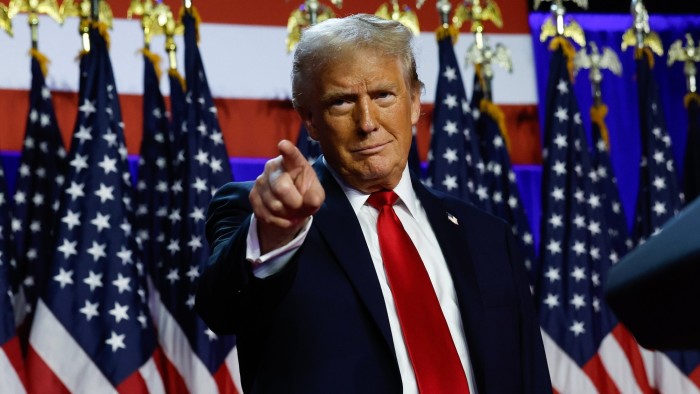Donald Trump will amplify American exceptionalism and divergence from Europe

Unlock the White House Watch newsletter for free
Your guide to what the 2024 US election means for Washington and the world
The author is chair of Marshall Wace, a multi-strategy investment manager
The US equity market has greeted the US election result with a celebratory run. I share the optimism. On almost every dimension, the policy mix is positive for US equities — deregulation, tax cuts, lower energy costs. What is not to like? It is also being implemented against a background of falling interest rates.
The only caveats to this positive outlook are the following. First, tariffs and immigration control are both inflationary and so the rate-cutting cycle will probably be shallower. The markets already revised up the level at which US rates will settle in this cycle from 3.4 per cent to 3.75 per cent in the run-up to the election.
Second, Donald Trump is evidently willing to take risks in his second term as president with deficit-financed spending in something of a rerun of Reaganomics. So the curve of bond yields from short to long-term maturities should steepen. This is, if anything, more of a medium-term concern.
Third, this mix of policies and, in particular, the upward revision of the rate structure should support a strong dollar, which would damp foreign earnings and revenues. However, these only represent 28 per cent of the S&P revenues and only 21 per cent of the Russell 2000, according to Goldman Sachs.
Fourth, the equity market is already expensive, trading at around 20-year valuation peaks for its cyclically adjusted price-earnings multiples. The premium valuation reflects an increasing market confidence in US exceptionalism, with the country enjoying leadership in all the main industries of the future, especially artificial intelligence. US exceptionalism has been an established feature of the global economy (and of stock market performance) since at least 2008, when the US economy began to break decisively from other developed countries and especially Europe.
The divergence between the US and the rest of the world will only be amplified by the Trump victory. There are some international economies and markets that have rival attractions, notably India and Japan and certain emerging markets, for various different reasons. But in many respects, the US is continuing to pull away from other nations, motored by its adherence to free market economics and its embrace of innovation. The Trump policy programme will only amplify this trend. The most palpable divergence is with Europe. Since 2009, US GDP per capita has almost doubled to $86,600, according to the IMF. Eurozone GDP per capita has risen about 17 per cent and now stands at just half the level in the US.
The EU has chosen a path of regulation over innovation and as a result Europe has no emerging leaders in AI or technology. This has been compounded by a unilateral adherence to net zero emissions targets, which will simply have the effect of exporting Europe’s energy production to the US and the Middle East and its industrial production to the US and China. Mario Draghi highlighted some of these issues in his recent report on EU competitiveness but, maybe in the spirit of the EU consensus, he appeared to pull his punches, especially on energy policy and net zero.
The UK could have escaped this nightmare through Brexit but sadly has used its independence to follow a similar path as the EU. The UK has one of the most aggressive deadlines for reaching net zero and now has a high tax and spend government. Trump has dropped welcome hints that he may be willing to grant the UK a separate trade deal and this would normally be a great opportunity for Britain. Which economy do we want to attach ourselves to for the next 50 years: the world’s economic locomotive or the world’s museum? The answer is straightforward. The US has pulled a long way ahead of the UK. We need to participate in the superior economic model that lies behind this progress. Prime Minister Sir Keir Starmer needs to put country over ideology in pursuing a deal. That is a big ask.
Europe’s problems will now be compounded by the Trump tariffs which will add further pressure on the Eurozone economy with only very modest GDP growth expected in 2025. The absence of growth will translate into bigger government deficits and political instability. European equities are cheap against their history. There are many good and well-managed companies. But they are in the wrong domicile and will be targeted with increasingly high tax rates by failing governments. Despite the relatively low valuations, European equity markets will continue to underperform. The attractions of the region to investors will primarily be for private equity investors as they pick out the many well-managed businesses from amid the rubble of the once well-managed region.
#Donald #Trump #amplify #American #exceptionalism #divergence #Europe




